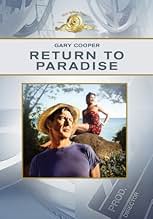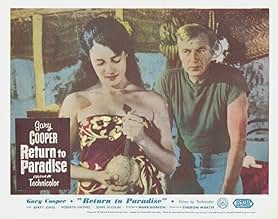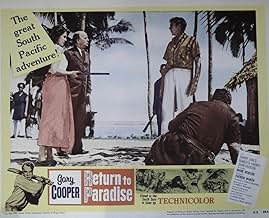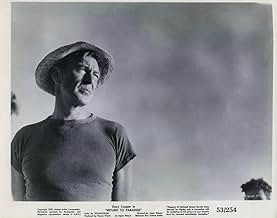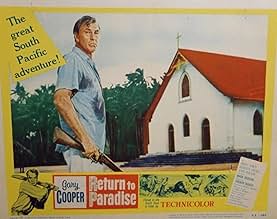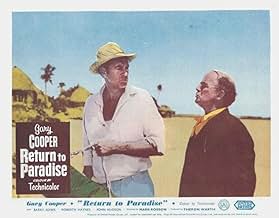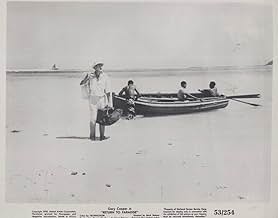IMDb RATING
6.0/10
909
YOUR RATING
An American drifter comes to a remote Polynesian island controlled by a Puritanical missionary and turns the social life of the island upside-down.An American drifter comes to a remote Polynesian island controlled by a Puritanical missionary and turns the social life of the island upside-down.An American drifter comes to a remote Polynesian island controlled by a Puritanical missionary and turns the social life of the island upside-down.
Moira Walker
- Turia
- (as Moira MacDonald)
Mamea Matatumua
- Tonga
- (as Chief Mamea Matatumua)
Va'a
- Rori at age 9
- (as Felice Va'a)
Frances Gow
- Mrs. Talbot
- (scenes deleted)
Brian McEwen
- Hank Elliott
- (scenes deleted)
Web Overlander
- Will Talbot
- (scenes deleted)
Henrietta Godinet
- Povana
- (uncredited)
- Director
- Writers
- All cast & crew
- Production, box office & more at IMDbPro
Featured reviews
Return to Paradise has a slow start, so if you're not a Gary Cooper fan, just hang in there and wait for it to get better. Trust me, it does. When I first read the synopsis it seemed like a comedy: Gary Cooper goes to a missionary-run island and shakes things up. How was I to know it was a James Michener classic? The exposition when Gary comes to the island, meets missionary Barry Jones, and settles into his grumpy isolation, is a bit slow. But a lot happens in this story; you just have to give it time.
If the protagonist were a different actor, it would have been an infinitely better movie. How many times have I said that about a Gary Cooper movie? To give him as much credit as I can, he does try his best in this movie. He actually does some acting! Still, he may be doing his best, but it's not as good as someone else's best.
I'd like to refrain from telling you about the plot, because it's very interesting to let it all unfold in Michener time and drama. Gary starts off the movie as a rude loner who likes his freedom and doesn't care who he offends. Barry Jones has to accept the intruder, but it makes things harder when one of the local girls is drawn to the aloof man. In addition to the unorthodox romance, I particularly liked Barry and Gary's unique friendship and how it changes throughout the years. You'll also get to see some beautiful location shoots, and as you might expect if you know Michener's work, it's a tearjerker. Enjoy!
If the protagonist were a different actor, it would have been an infinitely better movie. How many times have I said that about a Gary Cooper movie? To give him as much credit as I can, he does try his best in this movie. He actually does some acting! Still, he may be doing his best, but it's not as good as someone else's best.
I'd like to refrain from telling you about the plot, because it's very interesting to let it all unfold in Michener time and drama. Gary starts off the movie as a rude loner who likes his freedom and doesn't care who he offends. Barry Jones has to accept the intruder, but it makes things harder when one of the local girls is drawn to the aloof man. In addition to the unorthodox romance, I particularly liked Barry and Gary's unique friendship and how it changes throughout the years. You'll also get to see some beautiful location shoots, and as you might expect if you know Michener's work, it's a tearjerker. Enjoy!
This is a very unusual Gary Cooper film, quite out of the ordinary, Gary Cooper beach-combing in the South Seas, escaping from a troublesome past, probably the war, and finding new trouble and a second world war in Samoa. It's beautifully made efficiently directed by Mark Robson and has a great story to tell.
It's James Michener's story like continuing from "South Pacific" to another island with another human wreck of the war. Gary Cooper is a hard Irishman used to having to fight to get out of trouble and with a very hard and stubborn head. He gets into total conflict with a local tyrant of a missionary, who bullies the whole island, but the people, all Polynesians, see Gary as their possible saviour, and the conflict is gradually resolved as Gary and Barry Jones learn to cooperate. Domestic trouble awaits, though, and after a personal tragedy he finds himself obliged to continue running away from his fate. After many years he returns to the island just in time for new trouble from the second world war.
Curiously enough, this is not a very renowned or well known film, although it must be ranked among the best of its genre. It's filmed on location, and the insight into the life on the island among the natives is the chief asset and charm of the film. Gary Cooper makes a very convincing performance as a man of destiny having a hard time dealing with it, but ultimately he seems to come to terms with it. The happy end is perhaps the only objectionable detail of the film, which alone is not quite convincing. Like after "South Pacific", you expect the story to continue.
It's James Michener's story like continuing from "South Pacific" to another island with another human wreck of the war. Gary Cooper is a hard Irishman used to having to fight to get out of trouble and with a very hard and stubborn head. He gets into total conflict with a local tyrant of a missionary, who bullies the whole island, but the people, all Polynesians, see Gary as their possible saviour, and the conflict is gradually resolved as Gary and Barry Jones learn to cooperate. Domestic trouble awaits, though, and after a personal tragedy he finds himself obliged to continue running away from his fate. After many years he returns to the island just in time for new trouble from the second world war.
Curiously enough, this is not a very renowned or well known film, although it must be ranked among the best of its genre. It's filmed on location, and the insight into the life on the island among the natives is the chief asset and charm of the film. Gary Cooper makes a very convincing performance as a man of destiny having a hard time dealing with it, but ultimately he seems to come to terms with it. The happy end is perhaps the only objectionable detail of the film, which alone is not quite convincing. Like after "South Pacific", you expect the story to continue.
Gary Cooper was a 51 y.o man filming return to paradise. I had to google his bio at the beginning of the movie since i couldn't get past how elderly and frail he looked in this movie. I was so consumed by this that I couldn't watch and enjoy the movie since my focus was elsewhere.
Since I need to write more characters o will just ramble off with whatever I can. I can't believe I have to write a long sordid review just to make a point. This is absurd, like seriously why. Anyways if you really like Gary Cooper perhaps this movie might not be exactly ground breaking or perhaps it is I don't know since I was distracted like I said.
Oh I have enough characters.
Bye.
Since I need to write more characters o will just ramble off with whatever I can. I can't believe I have to write a long sordid review just to make a point. This is absurd, like seriously why. Anyways if you really like Gary Cooper perhaps this movie might not be exactly ground breaking or perhaps it is I don't know since I was distracted like I said.
Oh I have enough characters.
Bye.
Return to Paradise's main problem is that Gary Cooper at 52 is way too old for the part of the hedonistic Mr. Morgan. The part should have been played by someone like Kirk Douglas, William Holden, or Burt Lancaster.
Having said that Coop does all right in the role of the man whose arrival on one of the islands of the Samoan archipelago changes all around him.
The story begins in the late twenties when Cooper is put ashore on an island that is ruled by a tyrannical missionary preacher, Barry Jones, who's got 'wardens' to make sure that his decrees about the island's morality is enforced. Instinctively he knows that Cooper's arrival means trouble for his social order and tries to order him off the island. He even has Cooper's fledgling grass hut torn down because he's working on the sabbath.
But Coop's independent ways spark the latent resistance growing in the population. His taking on the 'wardens' is all that's needed.
Cooper has also fallen in love with a young Samoan girl, the beautiful Roberta Haynes. When she dies in childbirth, he leaves and becomes a charter schooner captain. Years later he returns and has to face up to his responsibility as a father.
A lot of Return to Paradise is a test of wills between Cooper and Barry Jones and at first glance Jones's character almost seems a caricature of a fire and brimstone preacher. It's not by any means on several levels. In his later work Hawaii, author James Michener explores that whole angle of the American missionaries in the 19th century and their impact on that Polynesian culture.
As he says in the film, Jones's father was killed in a native uprising and his wife died in childbirth. It made him bitter at the world and resulted in his creating a Christian Taliban like state on the island.
But there's a lot more to Jones than that. It turns out that the natives really did want to hear the good parts of his gospel and did not slacken in church attendance. There's a scene in the film when he sees the natives coming into his church where instead of going to the pulpit, he sits in the congregation among the natives. It's more eloquent than ten pages of dialog.
Jones becomes a better man and a wiser preacher as a result of Cooper's rebellion. He turns out to be a wise counselor indeed, especially when Cooper returns to the island and faces a crisis about his now teenage daughter, Moira McDonald. Essentially Cooper and Jones heal each other of the flaws in their respective characters.
Return to Paradise boasted a nice title song that is heard throughout the film. Later on Bing Crosby also used it as the title track of an album he did of south sea music for Frank Sinatra's Reprise label. It was composed by Dimitri Tiomkin and Ned Washington who last year gave Cooper that unforgettable theme from High Noon.
Filmed entirely on location on Samoa, it's a stunningly beautiful film to watch. You can't make a bad film from with that location.
It's one of Gary Cooper's lesser known works, but it's not a bad film and holds up well after over 50 years.
Having said that Coop does all right in the role of the man whose arrival on one of the islands of the Samoan archipelago changes all around him.
The story begins in the late twenties when Cooper is put ashore on an island that is ruled by a tyrannical missionary preacher, Barry Jones, who's got 'wardens' to make sure that his decrees about the island's morality is enforced. Instinctively he knows that Cooper's arrival means trouble for his social order and tries to order him off the island. He even has Cooper's fledgling grass hut torn down because he's working on the sabbath.
But Coop's independent ways spark the latent resistance growing in the population. His taking on the 'wardens' is all that's needed.
Cooper has also fallen in love with a young Samoan girl, the beautiful Roberta Haynes. When she dies in childbirth, he leaves and becomes a charter schooner captain. Years later he returns and has to face up to his responsibility as a father.
A lot of Return to Paradise is a test of wills between Cooper and Barry Jones and at first glance Jones's character almost seems a caricature of a fire and brimstone preacher. It's not by any means on several levels. In his later work Hawaii, author James Michener explores that whole angle of the American missionaries in the 19th century and their impact on that Polynesian culture.
As he says in the film, Jones's father was killed in a native uprising and his wife died in childbirth. It made him bitter at the world and resulted in his creating a Christian Taliban like state on the island.
But there's a lot more to Jones than that. It turns out that the natives really did want to hear the good parts of his gospel and did not slacken in church attendance. There's a scene in the film when he sees the natives coming into his church where instead of going to the pulpit, he sits in the congregation among the natives. It's more eloquent than ten pages of dialog.
Jones becomes a better man and a wiser preacher as a result of Cooper's rebellion. He turns out to be a wise counselor indeed, especially when Cooper returns to the island and faces a crisis about his now teenage daughter, Moira McDonald. Essentially Cooper and Jones heal each other of the flaws in their respective characters.
Return to Paradise boasted a nice title song that is heard throughout the film. Later on Bing Crosby also used it as the title track of an album he did of south sea music for Frank Sinatra's Reprise label. It was composed by Dimitri Tiomkin and Ned Washington who last year gave Cooper that unforgettable theme from High Noon.
Filmed entirely on location on Samoa, it's a stunningly beautiful film to watch. You can't make a bad film from with that location.
It's one of Gary Cooper's lesser known works, but it's not a bad film and holds up well after over 50 years.
"Return to Paradise" is a very strange Gary Cooper movie. His character is an odd one indeed--very admirable and brave on one hand and a total jerk on the other. The overall film, as a result is entertaining but far from satisfying.
The film begins with Mr. Morgan (Cooper) arriving on a small Polynesian island. The place is sort of a theocracy run by a VERY puritanical man, the Reverend Corbett (Barry Jones). However, Corbett and his personal band of thugs are quick to enforce their laws...but seem to take delight in not informing Morgan of the laws first! After he is attacked by these bullies, Morgan stands up for himself...and earns the respect of the locals who are getting sick of Corbett's mistreatment. Ultimately, and reluctantly, Corbett's thugs are chased off and the islanders are happy...and Corbett changes and becomes less nasty and puritanical over time. What also happens is that Morgan's new woman, Maeva, becomes pregnant and eventually dies in childbirth. At this point, Morgan shows that although he seemed like a pretty cool guy through much of the film, now he is a jerk, as he leaves his new daughter with her grandmother and he leaves the island.
Nearly two decades pass and WWII has broken out. Morgan finally returns to the island and finds he's sort of a folk hero...and Corbett is still there but has mellowed considerably. He also finds his daughter and their relationship is clearly problematic. It becomes more problematic later after some American airmen are stranded on the island...and Morgan begins acting like an overbearing and protective father...which makes no sense considering he'd abandoned this daughter for all these years.
The bottom line is that Morgan's character isn't at all consistent and the film felt frustrating as a result. Not a terrible film but one that sometimes just didn't make a lot of sense. Plus who wants to see a film where the leading man is actually a big hypocritical weasel?!
The film begins with Mr. Morgan (Cooper) arriving on a small Polynesian island. The place is sort of a theocracy run by a VERY puritanical man, the Reverend Corbett (Barry Jones). However, Corbett and his personal band of thugs are quick to enforce their laws...but seem to take delight in not informing Morgan of the laws first! After he is attacked by these bullies, Morgan stands up for himself...and earns the respect of the locals who are getting sick of Corbett's mistreatment. Ultimately, and reluctantly, Corbett's thugs are chased off and the islanders are happy...and Corbett changes and becomes less nasty and puritanical over time. What also happens is that Morgan's new woman, Maeva, becomes pregnant and eventually dies in childbirth. At this point, Morgan shows that although he seemed like a pretty cool guy through much of the film, now he is a jerk, as he leaves his new daughter with her grandmother and he leaves the island.
Nearly two decades pass and WWII has broken out. Morgan finally returns to the island and finds he's sort of a folk hero...and Corbett is still there but has mellowed considerably. He also finds his daughter and their relationship is clearly problematic. It becomes more problematic later after some American airmen are stranded on the island...and Morgan begins acting like an overbearing and protective father...which makes no sense considering he'd abandoned this daughter for all these years.
The bottom line is that Morgan's character isn't at all consistent and the film felt frustrating as a result. Not a terrible film but one that sometimes just didn't make a lot of sense. Plus who wants to see a film where the leading man is actually a big hypocritical weasel?!
Did you know
- TriviaThe 50th anniversary of the shooting of the film was celebrated on Upolu Island, Samoa, on November 5, 2003. Roberta Haynes, Donald Ashford, Terry Dunleavy, Moira MacDonald and local cast members were present.
- Quotes
Pastor Corbett: [to Maeva] You know it is a sin to stay out past nine o'clock!
- ConnectionsReferenced in Un roi à New York (1957)
- How long is Return to Paradise?Powered by Alexa
Details
Box office
- Budget
- $515,000 (estimated)
- Runtime
- 1h 40m(100 min)
- Color
- Aspect ratio
- 1.37 : 1
Contribute to this page
Suggest an edit or add missing content

